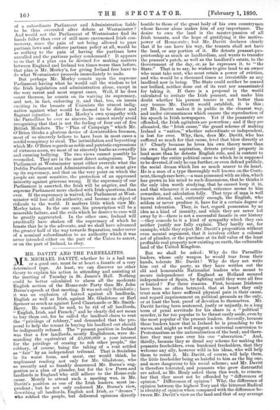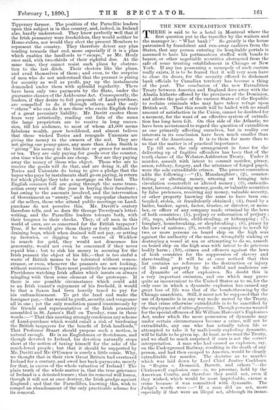MR. DAVITT AND THE PARNELLITES. MICHAEL DAVITT, whether he is
a bad man IV or a good one, must be at heart a fanatic of a very determined type. At least, we can discover no other theory to explain his action in attending and assisting at the meeting of Tuesday in St. James's Hall. Nothing could be better calculated to alarm all the moderate English section of the Home-rule Party than Mr. John Burns's speech at that meeting. It was not only Socialistic; it was an explosion of hatred against all landlords, English as well as Irish, against Mr. Gladstone or Earl Spencer as much as against Lord Clanricarde or Mr. Smith- Barry. He wanted, he said, to be rid of all landlords, "English, Irish, and French;" and he clearly did not mean to buy them out, for he called the landlord claim to rent the "privilege of robbery," and demanded that the pro- posal to help the tenant in buying his landlord out should be indignantly refused. The "present position in Ireland was that a few landlords, mostly Englishmen, were de- manding the equivalent of £5,000,000 a year interest for the privilege of ceasing to rob other people," the robbery, of course, being the taking of a rent settled as "fair" by an independent tribunal. That is Socialism in its worst form, and must, one would think, be unpleasant reading not only for Mr. Gladstone, who so- recently and so frankly denounced Mr. Burns's sug- gestion as a plan of plunder, but for the few Peers and landlords in England who still adhere to the Home-rule cause. Merely to attend such a meeting was, in Mr. Davitt's position as one of the Irish leaders, most im- prudent; but he not only endorsed Mr. Burns's view, describing all landlords, English and Irish, as " drones " who robbed the people, but delivered opinions directly hostile to those of the great body of his own countrymen whose favour alone makes him of any importance. The desire to own the land is the master-passion of all Irish tenants, and the hope of gratifying it the motive- power of Home-rule ; but Mr. Davitt declares clearly that if he can have his way, the tenants shall not have the land, or any portion of it. He detests peasant-pro- prietorship as much as landlordism, and wants to transfer the peasant's patch, as well as the landlord's estate, to the Government of the day, or, as he expresses it, to "the State." That is to say, he wishes to give land to an owner who must take rent, who must retain a power of eviction, and who would be a thousand times as irresistible as any landlord now in being. The State could neither be coaxed nor bullied, neither done out of its rent nor assassinated for taking it. If there is a proposal in the world calculated to irritate the Irish peasant, and make him doubt whether his present tenure is not better than any tenure Mr. Davitt would establish, it is this ; yet Mr. Davitt makes it in public in the clearest way, and under circumstances which ensure the reproduction of his speech in Irish newspapers. Yet if the peasantry are offended, the Irish agitators are powerless ; and if they are alienated, the "Irish cause," the grand scheme of making Ireland a "nation," whether subordinate or independent, is lost for ever. Why, then, does Mr. Davitt, who has suffered so much for that cause, level that blow directly at it ? Clearly because he loves his own theory more than his own highest aspiration, detests private property in land more than he detests English rule, and is content to endanger the entire political cause to which he is supposed to be devoted, if only he can further, or even defend publicly, the social dream which lies so much nearer to its heart.
He is a man of a type thoroughly well known on the Conti- nent, though rare here,—a man possessed with an idea, which has grown in his mind to such dimensions, that he thinks it the only idea worth studying, that he cannot keep it in, and that whenever it is concerned, reticence seems to him cowardice, and calculation folly. That type of man is well known abroad, and, curiously enough, the English, who seldom or never produce it, have for it a certain degree of moral toleration. They, in fact, regard possession by an idea as a kind of insanity, and while they are never led away by it—there is not a successful fanatic in our history —they concede to it a kind of sympathy which they can neither justify nor fully explain. They hardly see, for example, while they reject Mr. Davitt's proposition without even mental argument, that it involves either a colossal act of plunder, or the purchase at its full value of the least profitable real property now existing on earth, the culturable land of the United Kingdom.
But we shall be asked : Why do the Parnellite leaders, whose only weapon he would tear from their hands, tolerate Mr. Davitt? Why do they not write him out of the party, as they have written out the old and honourable Nationalist leaders who meant to secure independence of England as Holland secured independence of Spain, by fighting until they were all free or buried ? For three reasons. First, because Irishmen have been so often betrayed, that at heart they only trust men who have suffered physical pain in their cause, and regard imprisonment on political grounds as the only, or at least the best, proof of devotion to themselves. Mr. Davitt having been sentenced, justly or unjustly, to a long term of penal servitude for his share in a " political " murder, is far too popular to be thrust easily aside, even by the most popular of the present leaders. Secondly, because those leaders know that in Ireland he is preaching to the waves, and might as well suggest a universal conversion to Protestantism as the nationalisation of the land; and there- fore they may pass over his one "aberration." And, thirdly, because they so dread any scheme for making the peasants freeholders, even burdened freeholders, that they welcome any ally, however wild in his ideas, who will help them to resist it. Mr. Davitt, of course, will help them, the little freeholder being as hateful to him as the big one, and more dangerous to his social scheme; and Mr. Davitt is therefore tolerated, and peasants who grow distrustful are asked, as Mr. Healy asked them this week, to remem- ber that they must not be offended by "differences of opinion." Differences of opinion ! Why, the difference of opinion between the highest Tory and the bitterest Radical is identity of opinion when compared with the difference be- tween Mr. Davitt's view on the laud and that of any average Tipperary farmer. The position of the Parnellite leaders upon this subject is in this country, and, indeed, in Ireland also, hardly understood. They know perfectly well that if the Irish peasantry were freeholders, they would neither be Home-rulers, nor would they elect the present Members to represent the country. They therefore detest any plan tending towards that end, more especially if it is a plan which enables the landlords to "escape," as Mr. Healy once said, with two-thirds of their rightful due. At the same time, they cannot resist such plans by obstruc- tion to the last ditch. Their electors like the plans, and avail themselves of them ; and even, to the surprise of men who do not understand that the peasant is pining for security as well as profit, pay up the instalments demanded under them with splendid regularity. There have been only two payments by the State, under the guarantee clauses of the Ashbourne Act. Consequently, the leaders, if they desire to foil proposals of Land-purchase, are compelled to do it through others, and the only " others " who can do it are those who excite English fears of a great pecuniary liability. Mr. Davitt excites those fears very artistically, reading out lists of the sums the large proprietors are to receive in long succes- sion, till his audience, to most of whom £1,000 seems fabulous wealth, grow bewildered, and almost believe that those wicked Tories and renegade Unionists are giving the money to the owners of the soil. They are not giving one penny-piece, any more than John Smith is " giving " his money to the butcher or grocer for mutton or tea. They are only paying for goods over the counter, at-a time when the goods are cheap. Nor are they paying away the money of those who object. Those who are to receive the goods will do that, and are doing it, all the Tories and Unionists do being to give a pledge that the buyer who pays by instalments shall go on paying, in return for which pledge they take a mortgage on the land. The English common folk are going through the same trans- action every week of the year in buying their furniture ; but owing to the amounts involved, and the intervention of Government as "surety," and the unpopular character of the sellers, those who attend public meetings on Land- purchase do not perceive this. Mr. Davitt's oratory therefore tells, and so does Sir George Trevelyan's letter- writing, and the Parnellite leaders tolerate both, with their tongues in their cheeks. They, of all men in this world of ours, are so concerned for the British taxpayer ! True, if he would give them thirty or forty millions for draining bogs, which when drained will not pay, or setting up factories, or digging to the centre of Wicklow in search for gold, they would not denounce his generosity, would not even be concerned if they never repaid him ; but to risk his money in securing for the Irish peasant the object of his life,—that is too sinful a waste of British means to be tolerated without remon- strance, or even, whenever the peasants are not looking, without resistance ! There must positively be some separate Providence watching Irish affairs which insists on always mingling with them some element of the grotesque. If there is one possible circumstance which could add to an Irish tenant's enjoyment of his freehold, it would be that a Saxon had been heavily taxed to pay for his enfranchisement. To get the land and make the foreigner pay,—that would be profit, security, and vengeance all in one ; yet the only resolution passed unanimously by the friends and representatives of the Irish peasantry assembled in St. James's Hall on Tuesday, runs in these words :—" That this meeting strongly condemns any scheme of Land-purchase which would entail a risk of burdening the British taxpayers for the benefit of Irish landlords." That Professor Stuart should propose such a motion, is natural enough. He is an Englishman or Scotchman, and though devoted to Ireland, his devotion naturally stops short at the notion of taxing himself for the sake of the much-loved people ; but that it should be supported by Mr. Davitt and Mr. O'Connor is surely a little comic. Why, we thought that in their view Great Britain had overtaxed Ireland for a century, and owed her back-payments, merely for that, in excess of the whole valuation of Ireland ! The plain truth of the whole matter is, that the true grievance of Ireland is a detested tenure ; that its removal will lessen, though it will not at once destroy, the Irish grudge against England ; and that the Parnellites, knowing this, wish to compel an abandonment of the only practicable scheme for its removal.



































 Previous page
Previous page